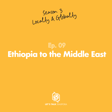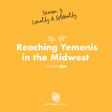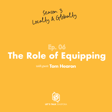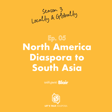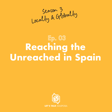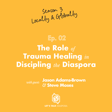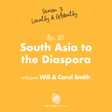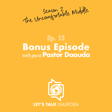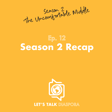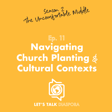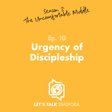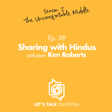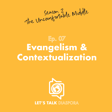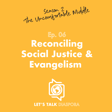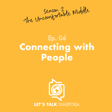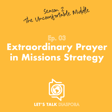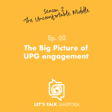The Unreached Coming to North America
00:00:02
Speaker
Are you a pastor, ministry leader, or volunteer? Perhaps a stay-at-home parent, business executive, or college student. Do you desire to see the nations come to faith in Jesus Christ?
Introducing Global Gates and Involvement
00:00:14
Speaker
Let me tell you something fascinating. Something that is happening in our lives that's never happened before. The nations are coming to us.
00:00:23
Speaker
Yes, where we once had to travel across the world to share the gospel, the nations are now coming to North America through means of business, tourism, university study, and more. The world's most unreached people groups are coming to us. The next best question to ask?
00:00:42
Speaker
How do we reach them with the gospel? I want to introduce you to a missions organization called Global Gates. Global Gates exists to reach the ends of the earth through Global Gateway Cities. You too can be involved in this mission from wherever you are. Simply go to globalgates.info for more information.
Meet Ted Essler: Background and Insights
00:01:11
Speaker
Well, hello, everyone. We're back at Let's Talk Diaspora. And we're in season three and so excited about the season. I am just learning so many things. So we have a special guest. Bud, you want to tell us a little bit about our special guest today? Yeah, we're so grateful to have Ted Essler on as the guest. Ted is the president of Missy O'Nexus, which is an association of agencies and churches representing over 50,000 great commission workers worldwide.
00:01:42
Speaker
Ted worked in the computer industry before serving in Sarajevo Bosnia during the 1990s. In 2000, Ted became the Canadian director of Pioneers and three years later moved to Orlando to join Pioneers USA's leadership team.
00:01:57
Speaker
He was appointed the president of Missy O'Nexus in 2015, and his most recent book is The Innovation Crisis, Creating Disruptive Influence in the Ministry You Lead. Ted has a PhD in intercultural studies from Fuller Theological Seminary, and we're so glad to have all of that wealth of experience and knowledge on the podcast. Welcome, Ted. Hey, thanks for having me. Appreciate looking forward to the discussion.
00:02:23
Speaker
Why don't you start by telling us a little, is there anything that wasn't in that introduction? Maybe a fun, something fun to know about you. Tell us something a little extra about yourself. Well, I'm a riparian. Do you know what a riparian is? Most people don't. We'll say it again. A riparian. R-I-P-A-R-I-A-N.
00:02:48
Speaker
A riparian is somebody who lives along the banks of a river, a lake, or a body of water. And my wife and I live in a beautiful lake in Florida here. It's called Alligator Lake. And yes, we do have alligators. We have a boat, and we do a lot of water sports. We love the water. So that's kind of who we are. We're the folks that are always inviting you over to go wakeboarding or water skiing, that kind of a thing.
00:03:17
Speaker
I now have a new title that I want to, I want to earn a repair. Yeah, it's, it's actually us. We have a view. When am I quiet time in the morning? I can look out across just this gorgeous piece of creation. Very blessed to be here.
Bosnia War Experience and Missiological Impact
00:03:37
Speaker
Ted, you did spend some time overseas and a lot of people that listen to the podcast are either working cross-culturally or they have or they're aspiring to. But just knowing some history from the Balkans and especially Bosnia in the 1990s, tell us a little bit about what you experienced there just to give some conceptual ideas of where maybe a lot of your missiological thought and experience kind of was birthed.
00:04:04
Speaker
But we did spend almost that whole decade, which was all the war years in Croatia and Bosnia. When we first moved there, our plan was to move to Sarajevo, but it was really in the midst of so much dangerous warfare that we ended up moving first to Croatia, about the same time that the UN moved to Croatia and tried to tamp down the fighting there. Lived in Croatia for a number of years, was able to study language,
00:04:32
Speaker
It's pretty much the same language between Croatia, Bosnia, and Serbia. And went to university there, was involved with a couple of different local ministries there before we moved to Sarajevo, right after the Dayton Peace Accords were signed. And we were blessed because we were on a team with other workers that all have the chance to study language.
00:04:57
Speaker
before they actually moved into place. So when we got into Sarajevo, we were really ready to get to work. Had wonderful partners that we worked with there. At that time, Bosnia had a very, very small, very small church and Christian movement there. That'd still be true. But it was even smaller, of course, back then. And not just through our efforts, but through the efforts of many in the four years, that 96 to about 2000, that we were there.
00:05:27
Speaker
I don't know about the church drew to about a thousand people. And that was a time of real harvest and a real great blessing to be there. But it certainly impacted our missiology, our thinking about ministry, what it's like to minister in a post-war situation, just so many various issues. That part of the world is just abjectly beautiful. The people are wonderful.
00:05:57
Speaker
I would love to be able to go back and spend a few more years. And you never know what the Lord has in store. So it was a blessing to be in Bosnia. I want to visit Bosnia. I've spent time in Kosovo and Albania. And so, yes, I will concur the lovely part of the world.
Understanding Frontier People Groups
00:06:18
Speaker
And so now you're leaving Missy O'Nexus.
00:06:24
Speaker
And one of the things that we're going to talk about today and really just try to try to learn from you some is is the idea of frontier people groups. And so, you know, that that's a term that we can unpack. And I'd love for you to kind of give some background on that. But Bosnians or Bosniaks, you know, Muslims from Bosnia are considered a frontier people group. And because of the war, there's a few hundred thousand in the United States. I think some estimates are three hundred thousand Bosniaks in the US and places like
00:06:54
Speaker
know, St. Louis, Missouri, Chicago, Illinois, there's huge populations. So really what we want us to kind of get to is talking about frontier people groups. But with the view of is, is there opportunity to see frontier people groups reached in the diaspora? So that's where we're trying to get to. But first, maybe you can just tell us a little bit of the history that you know of, of kind of the idea of frontier people groups. Yeah, I think so.
00:07:23
Speaker
Frontier people groups are a subset of what unreached people groups are. I think that's important for people to understand that they're almost a finer definition because an unreached people group, you know, the classic definition that's used is that there's less than 2% Christians in that people group. Well, frontier people groups are the extreme cases where there's less than one-tenth of 1%
00:07:51
Speaker
There's very little to no progress being seen or being made. You know, let me just preface that. Miseologists use words like, or phrases like no churches. Well, that's not true for Bosnia. Bosnia has a couple of churches. So even though the formal definition says no churches or no believers or that kind of a thing,
00:08:19
Speaker
In almost all these frontier people groups, you could probably find a couple of believers. You might find a church or two, but the overwhelming numbers are such that these are people groups that are on the extreme end of being unreached, often with nobody at all making a sustained coordinated effort to try to reach them. And I think that your example of Bosnians, it's a really great one,
00:08:49
Speaker
When I left there, I mean, it's been 23 years. I would say the church grew more in the four years post-war than it has almost since that time. And so a lot of times these frontier people groups are highly resistant. There are reasons why they are not ripe. And I think there's also a spiritual dynamic in which for whatever reason, God's just not moved there yet.
00:09:19
Speaker
You know, a Frontier People Group is this very unique case kind of on the extreme end of what it means to be unreached. Let me just share an interesting statistic I came across recently. I actually got this in a PowerPoint from Rebecca Lewis, who is Ralph Winter's daughter. And she has a little presentation she does on Frontier People Groups. And she has a chart in there that shows that in 1980,
00:09:49
Speaker
60% of the world's population lived in frontier people groups. Whereas today, 2023, 2024, 25% of the world's population lives in frontier people groups.
Prioritizing Missions: Beachhead Ministry Focus
00:10:05
Speaker
Now that's astounding progress that we've moved that far and narrow the number of frontier people groups down, but they remain and continue to be among
00:10:19
Speaker
the least of the least reached with the greatest need for missiological concern and prayer. Ted, one of the things that
00:10:31
Speaker
Whenever we start talking about unreached people groups and need for workers, I'd just love to hear your response to this. One of the pushbacks I often get is if we create a priority, meaning saying that there's a greater need, that we're also communicating that someone else has less need, meaning that we're elevating someone else's salvation over someone else's.
00:10:55
Speaker
How do you respond to that? Because I think like when we talk about these things, that's not our intention, but sometimes that's what people hear. How have you been able to discuss that with people? Yeah, well, I think first of all, the going all the way back to the Abrahamic Covenant, it talks about nations and the great commission that Jesus, you know, go into all nations, Ponta to have me that that whole press is
00:11:25
Speaker
from a biblical perspective, that is the language that's used. And I want to make sure, you know, obviously we're talking about unreached people groups here, not nation states.
00:11:37
Speaker
But I do think this idea of the Ponta to Ephema, all people groups, is the primary focus that we see in the New Testament, in the Bible generally. And so, you know, first of all, as we formulate and strategize, I do think we need to recognize that that's the paradigm that's used in Scripture. The second thing I would just say is, you know, I have a, there's probably a bias that I have, but the single best use of
00:12:06
Speaker
outside the culture or foreign missionaries is, in my view, beachhead ministry. The gospel, once it's inserted into a culture, that it's an indigenous thing from that point forward. Unfortunately, in the history of mission, we basically have stuck around too long. We have tried to do what indigenous people are better at doing than we as outsiders are.
00:12:36
Speaker
And so, you know, one thing I would just say is when you look at priority, part of that includes the concept of what's the best use of us as outsiders. And it really doesn't matter if that outsider is a culturally near or culturally proximate people group. Like you may be in a place where there's, you know, people group A next to people group B, which has already reached
00:13:03
Speaker
People Group B has a similar language. They're going to be better missionaries, etc, etc. But even there, the best use of the proximate missionary is the initial beachhead that's established in that culture. After that, initial church gets up and running and captures a vision for reaching the rest of the culture.
00:13:23
Speaker
best thing we can do essentially is get out of the way and let them go to work. Now, I don't mean that literally, there may be training needs, there may be theological education, there may be some resourcing things, but frontier people groups are interesting when it comes to this priority question because they truly represent the places where you need outsiders. You need someone that's a believer to come in from the outside and influence that people group.
00:13:53
Speaker
Earlier you spoke about a lot of these frontier people groups that there are churches. There may be just a few, just tiny few. Have you seen coming alongside of some of those churches being an important piece of the outsider coming in? You know, I would have to answer that question with a sometimes. Sometimes those churches
00:14:21
Speaker
When you're a minority church in a majority culture that hates you in some cases, you are struggling to survive in that context. And there might be things that outsiders, and I'm not talking about Western missionaries here. It might include Western missionaries, but I'm just talking about outsiders. It might be that outsiders coming in provide actually a better methodology for how the gospel is going to further penetrate.
00:14:52
Speaker
On the other hand, if you do have a healthy church inside a Frontier People group, then why would you not seek to partner with, help, assist, work with that church? I do think it's common for us, and I think I did some of this myself when I was a missionary, to think that, hey, this small, struggling, indigenous church, they really don't have a vision.
00:15:21
Speaker
for reaching the rest of their culture, I'm gonna do it. But that's probably a case often where going slow, developing relationship capital and some understanding is going to open the doors for a much deeper, longer term work in that place. So those are our questions. When you work in a frontier people group, the other issue I think you face there are issues surrounding how indigenous that church is.
00:15:50
Speaker
I've been to churches, for example, in India, that if you're a Muslim walking into that church, you'd feel like you were in a Hindu environment because they've adopted so many of the forms of Hinduism as they've contextualized that Hindu context. So those are all things that you have to evaluate and think through. But just as a guiding principle, I do think we have to remember that partnership
00:16:17
Speaker
unity, those types of concepts are theologically infused concepts. And so it's only after I would think some serious prayer conversation, and with some maturity, maybe not as a first, first, you know, two or three year missionary, can you make those evaluations well.
00:16:39
Speaker
Ted, a term that I use frequently and just grateful you kind of brought this up is I say often that we as outsiders, as Westerners, we just have to clarify our best contribution. And I just found it extremely helpful to have a contribution mindset. Sometimes we use the words, you know, ownership, we're taking ownership of this.
00:16:59
Speaker
It's it's not ours. We're we're just contributors And at different phases Our contribution is different for a frontier people group, you know learning language doing evangelism doing disciple making is very important you go to a context where it's 3 evangelical Our contribution is entirely different sure yeah, and I Unfortunately the way that we train people
00:17:25
Speaker
often in missions is for the missionary to really be at the center at the core of the ministry. In many cases the best thing for the missionary to do is actually be a facilitator coach and to work alongside an indigenous person. So I do think this is an area that we've struggled in as a western missions movement. We're much better at it now than we were before but I think we still have a ways to go
00:17:53
Speaker
Well, as you've introduced to us a little more about frontier people groups, can you tell us more about how you've seen that work in more of the diaspora setting?
Diaspora Ministries: Opportunities and Challenges
00:18:05
Speaker
Sure. You know, I kind of have a bit of a mixed opinion on how it's going to work in a diaspora setting. First of all, you have some incredible opportunities. We keep talking about the Bosnians here, but they are a great example of a frontier people group.
00:18:22
Speaker
I mean, if you go to St. Louis, you can visit numerous Bosnian restaurants. And if you go, by the way, have some cevapi, it's the best thing. It's just incredible. But in any case, you can go into these communities and you will see very Bosniak oriented communities. And there's a huge need there. Now, that said, I do think some of the messaging on diaspora has been that you don't need to go because everybody's coming here.
00:18:53
Speaker
But I think research has shown that there are vastly large frontier people groups.
00:18:58
Speaker
And as far as we know, there are none of them in the United States, or if there are, there's so few and far between and distributed in mega cities that there's not really a cultural cluster for you to work with them or address them as they are in their own culture. So, you know, I would say, you know, that thing about diaspora to keep in mind is it's not just diaspora in the US, there's diaspora globally. So you actually might find better diaspora ministry opportunities working in New Delhi.
00:19:29
Speaker
with Muslim people groups from northern India that are Muslim. They're doing diaspora work in a sense because they're not in northern India any longer. Now they're in Hindu Delhi. So in other words, this concept of diaspora, it really is a global phenomenon and there's opportunities
00:19:49
Speaker
Everywhere in the world when it comes to diaspora ministry, and I think a lot of that probably touches You know there's a there's a couple of mega unreached blocks of Frontier people groups and certainly northern India is one of them in fact As a recording this this article has not yet been published, but by the time this is out. It'll probably be published I'll tell you that we just completed a look at
00:20:19
Speaker
We're calling it the center of global missions need. So you probably heard about the shifting center of the global church. It's been talked about a lot in missiology and they talk about how the center of the global church is moving away from the West. Well, what we never seem to talk about is where the greatest geographic need would be if we mapped the frontier people groups and the unreached people groups of the world. And that happens to be in Gujarat, India.
00:20:50
Speaker
that geographic, it's called a centroid, weighted by population. And so, you know, I would just say, let's make sure that when we talk about diaspora, we're keeping ourselves open to the fact that diaspora still might be sending missionaries to a foreign country to engage in diaspora peoples that are living in that country. But no doubt, the mega urban centers, even here in the US,
00:21:17
Speaker
have so many opportunities for Frontier People Group ministry. It is a crazy time to be in diaspora ministry for that reason. Yeah, I think we both agree that diaspora ministry is an opportunity, strategic opportunity, but it's also a great mobilization opportunity to get people back to country of origin. For sure. You know, I worked in Croatia and Bosnia and
00:21:46
Speaker
When I was there, I studied the history of the small Baptist church. So in Croatia, you do have a Baptist movement. When I was living there, it was probably 3,000 to 5,000 people. Now it's much larger than that. They've had some great success on the ground. But if you study that history, what you learn is that that Baptist church was initially planted by a large family. They had moved in the early 1900s to the United States. They worked in manufacturing. They got into the auto industry in Detroit.
00:22:16
Speaker
And then at the conclusion of this First World War, they relocated back to Zagreb, Croatia, and they started the Baptist church there. And now all those Baptist churches in Croatia, they trace their roots back to diaspora ministry that was done in Detroit in the US in the early 1900s. And so, you know, this idea that, you know, missionary work is always done by inserting people into other cultures,
00:22:44
Speaker
You know, obviously that's not true. I bet you if we traced the history of indigenous churches globally, you would find that many of them have been carried in by people who are diaspora populations at one time in their background.
00:23:06
Speaker
which is really encouraging to think about us being able to continue to do that through the diaspora. So what are some ways that you see the diaspora going into the frontier people groups, through whatever city that might be in?
Diaspora Networks: Church Planting Strategies
00:23:26
Speaker
Well, I know there are, you know, ministries that are specifically designing strategy around
00:23:36
Speaker
reaching people here with the goal of setting them back. And they're adopting church forms and methods of church planning that are highly transferable so that those methodologies can be returned home and utilized back home. So obviously that's one thing that's available as a tool for organizations and ministries to be thinking about. I'd say another way that that is happening
00:24:05
Speaker
If you were to take, for example, I mean, you almost could name the population, but look at Afghans. So we got a lot of Afghans in the US right now, a lot of Afghans. And there are frontier people groups inside Afghanistan. Afghanistan is not a culturally homogenous place. There's numerous languages. There's numerous different people groups in that nation. And as you may know, if you're an immigrant,
00:24:35
Speaker
you have a lot of connections back home, especially if you're an immigrant in the wealthy West, because in many cases, the cultural expectation you have for yourself and that your family has for you is that you're helping financially, as there are a lot of times in financially disadvantaged places. So, you know, those types of ministries are able to, if you had an Afghanistan ministry,
00:25:03
Speaker
and you saw a few dozen Afghanis become believers, their network has simply not bound geographically. Their network is global. And they're like you and me, they've got that phone in their pocket, and they're communicating on a daily basis with people all over the world. So those types of opportunities are making diaspora ministry all that more important in projecting the church back home and globally.
00:25:35
Speaker
So one of the things, technology is fueling that, like you said, there's no geographic boundaries for a lot of these people because of their relationships. Their OICOS locally is probably fractured, but their OICOS, the relational network globally is through technology.
00:25:51
Speaker
But one of the things that I have noticed is, and this is, I think a lot of people understand, as soon as someone leaves their host culture and goes to another culture, their identity begins to shift, right? And depending on the age that happens, the speed of that, do you see, like Bosniaks, for example, many who have been in the United States for a couple of decades, that they're less culturally
00:26:20
Speaker
Bosnian than people living in Bosnia Well, you know for sure I would also say that's somewhat a condition of the culture they're coming from I Mean take the Somali population in Minneapolis. They're they're not integrating compared to other cultural groups and
00:26:41
Speaker
They're much more likely second and third generation to continue to retain much of the original culture. That's one of their goals. I would say Bosnians aren't quite as much that way. They're much more adaptable and are much more likely to try to integrate into the broader community. You might see some things like I'm aware of a Bosnian family, moved to the US,
00:27:10
Speaker
within six or seven years. Mom and dad had their own house, kids had their own house, raising their own family. But then one day they kind of said, why are we doing this? Back home, we all live in one very large house. And then we have lots of advantages for being in that cultural situation. So they sold the homes and they bought one that they could all live in together. So there's probably a little bit of back and forth there. But let me just say that
00:27:36
Speaker
One of the things that is an opportunity in diaspora ministry is just realizing that these families are struggling. So when they feel their teenage kids, for example, being lost to the new culture that they're living in, that's a serious struggle for them.
00:27:56
Speaker
And that's a time when we in the church could step in and encourage them, could help them, try to help them do some cultural interpretation as to what's happening with their child. That's a real opportunity. I'm aware of a ministry, and that's pretty much what they do, is they help families as the second and third generations
00:28:21
Speaker
begin to assimilate, they help those families adjust to that assimilation process. That's a time of grieving a lot of times for the original immigrants that came over. So yeah, those are all great issues that provide opportunities for us to love people in difficult situations.
00:28:46
Speaker
So Ted, um, we've asked you a number of questions. I want to give you an opportunity to tell us what's exciting you right now. What, what are you excited about? What are, where does God have you, um, studying, growing, moving forward?
Missy O'Nexus: Progress and Renewed Mission Focus
00:29:01
Speaker
Yeah. You know, I would say, believe it or not, uh, every year missing on excess has a, um, theme and our theme this year is priority.
00:29:12
Speaker
And it's about exactly what we're talking about on this podcast. It's surrounding the issues of unreached people groups. In 2024, it marks 50 years since Ralph Winter gave his paper at Lausanne talking about unreached people groups. And so in light of the fact that it's been 50 years, we're spending this year evaluating progress
00:29:39
Speaker
We're evaluating what are the failures of that paradigm and that missiology? What are things that it can teach us about right now? And so for example, that idea of the geographic center of global mission need, that came out of this process of evaluation of where are we? How far have we come? And is it something we want to adopt into the future? I would say right now what I'm most excited about is
00:30:08
Speaker
In my missiological research, I feel like there's going to be a rejuvenation of this idea of priority, the idea that we need to really be focusing on those places where there are the fewest Christians and the fewest churches. Part of that stems from a concept called mutuality, the idea that when we work with people cross-culturally, we really do need to see them as created in the imago dei.
00:30:38
Speaker
the image of God and give them the kind of human dignity that we should be extending to them as believers in the Imago day. And what that, what that realization leads you to is the role of the missionary that again, that we already touched on, that the best use of a missionary is establishing beach heads and not controlling the church in any ongoing kind of a way.
00:31:04
Speaker
It's using strategies that put indigenous people into positions of leadership, I would say sooner than traditional forms of missiology have put them into positions of leadership and really trying to empower the indigenous church in many different ways. So those ideas for me are kind of all coalescing. And I think they're coalescing at a time when the concept of missions as nothing more than colonial,
00:31:32
Speaker
is being talked about a great deal in our culture. And so that's probably the area that's got me most excited to learn about, to grow in, and to research. So just to wrap up, Ted, how can people learn more about Missy O'Nexus, get involved?
Getting Involved: Missy O'Nexus Resources
00:31:50
Speaker
How can they follow this year's theme of priority?
00:31:54
Speaker
Well, obviously we have a website, missyonexis.org. That is our single best connecting point. I'd encourage people to get an account on there. They'll find out we have a area of our website, it's called groups. It's like online forums around topics, around roles in mission. For example, member care and people development is an area that has a lot of traffic. People that are working to support help and do kind of HR tasks inside of agencies. We have a group, another group is called
00:32:25
Speaker
organizational initiatives and sexual wholeness, trying to address some of the sexual brokenness in the people coming into our agencies and things that happen on the field, et cetera. There's all sorts of interest groups along that line. And I would encourage people, we're a membership organization, but the groups are completely free and open to anyone. If you're in a church, encourage you to join as a church.
00:32:51
Speaker
And, uh, just jump in, we do an annual conference, which also has a missions pastor angle to it. And that, uh, missions pastor conference for us, we think is going to be a growing part of what we do moving into the future. I'll also add that Rebecca and I are part of the diaspora group on miss you nexus. So you can, you can join us in conversation there.
00:33:17
Speaker
Ted, thank you so much for being on Let's Talk Diaspora. This is something I'm so glad that Miss You Nexus is focusing on for 2024 and really just am excited in a lot of the same ways that you are. So thanks for joining us and thank you for listening to Let's Talk Diaspora.

